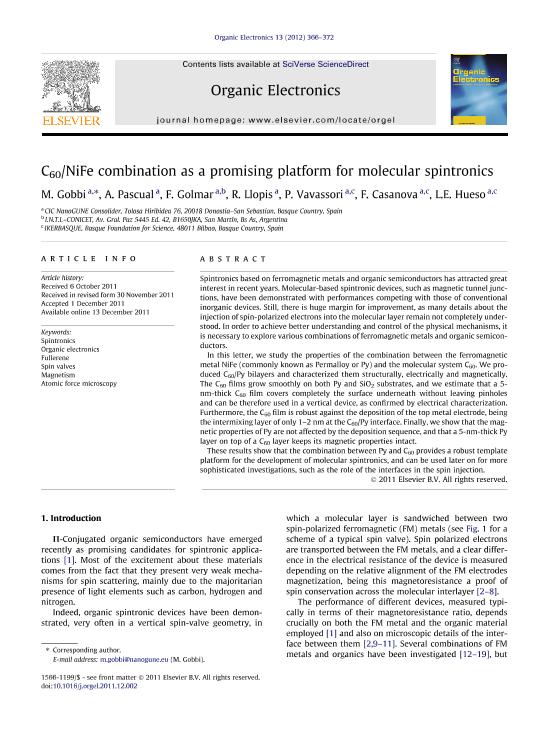Mostrar el registro sencillo del ítem
dc.contributor.author
Gobbi, M.
dc.contributor.author
Pascual, A.
dc.contributor.author
Golmar, Federico

dc.contributor.author
Llopis, R.
dc.contributor.author
Vavassori, P.
dc.contributor.author
Casanova, F.
dc.contributor.author
Hueso, L. E.
dc.date.available
2023-04-20T13:43:22Z
dc.date.issued
2012-03
dc.identifier.citation
Gobbi, M.; Pascual, A.; Golmar, Federico; Llopis, R.; Vavassori, P.; et al.; C60/NiFe combination as a promising platform for molecular spintronics; Elsevier Science; Organic Electronics; 13; 3; 3-2012; 366-372
dc.identifier.issn
1566-1199
dc.identifier.uri
http://hdl.handle.net/11336/194730
dc.description.abstract
Spintronics based on ferromagnetic metals and organic semiconductors has attracted great interest in recent years. Molecular-based spintronic devices, such as magnetic tunnel junctions, have been demonstrated with performances competing with those of conventional inorganic devices. Still, there is huge margin for improvement, as many details about the injection of spin-polarized electrons into the molecular layer remain not completely understood. In order to achieve better understanding and control of the physical mechanisms, it is necessary to explore various combinations of ferromagnetic metals and organic semiconductors. In this letter, we study the properties of the combination between the ferromagnetic metal NiFe (commonly known as Permalloy or Py) and the molecular system C60. We produced C60/Py bilayers and characterized them structurally, electrically and magnetically. The C 60 films grow smoothly on both Py and SiO2 substrates, and we estimate that a 5-nm-thick C60 film covers completely the surface underneath without leaving pinholes and can be therefore used in a vertical device, as confirmed by electrical characterization. Furthermore, the C 60 film is robust against the deposition of the top metal electrode, being the intermixing layer of only 1-2 nm at the C60/Py interface. Finally, we show that the magnetic properties of Py are not affected by the deposition sequence, and that a 5-nm-thick Py layer on top of a C60 layer keeps its magnetic properties intact. These results show that the combination between Py and C60 provides a robust template platform for the development of molecular spintronics, and can be used later on for more sophisticated investigations, such as the role of the interfaces in the spin injection.
dc.format
application/pdf
dc.language.iso
eng
dc.publisher
Elsevier Science

dc.rights
info:eu-repo/semantics/openAccess
dc.rights.uri
https://creativecommons.org/licenses/by-nc-sa/2.5/ar/
dc.subject
ATOMIC FORCE MICROSCOPY
dc.subject
FULLERENE
dc.subject
MAGNETISM
dc.subject
ORGANIC ELECTRONICS
dc.subject
SPIN VALVES
dc.subject
SPINTRONICS
dc.subject.classification
Física Atómica, Molecular y Química

dc.subject.classification
Ciencias Físicas

dc.subject.classification
CIENCIAS NATURALES Y EXACTAS

dc.title
C60/NiFe combination as a promising platform for molecular spintronics
dc.type
info:eu-repo/semantics/article
dc.type
info:ar-repo/semantics/artículo
dc.type
info:eu-repo/semantics/publishedVersion
dc.date.updated
2023-04-19T15:26:27Z
dc.journal.volume
13
dc.journal.number
3
dc.journal.pagination
366-372
dc.journal.pais
Países Bajos

dc.journal.ciudad
Amsterdam
dc.description.fil
Fil: Gobbi, M.. No especifíca;
dc.description.fil
Fil: Pascual, A.. No especifíca;
dc.description.fil
Fil: Golmar, Federico. Instituto Nacional de Tecnología Industrial; Argentina. Consejo Nacional de Investigaciones Científicas y Técnicas; Argentina
dc.description.fil
Fil: Llopis, R.. No especifíca;
dc.description.fil
Fil: Vavassori, P.. No especifíca;
dc.description.fil
Fil: Casanova, F.. No especifíca;
dc.description.fil
Fil: Hueso, L. E.. No especifíca;
dc.journal.title
Organic Electronics

dc.relation.alternativeid
info:eu-repo/semantics/altIdentifier/doi/http://dx.doi.org/10.1016/j.orgel.2011.12.002
Archivos asociados
